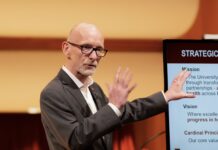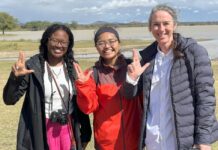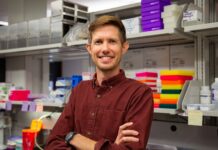Melinda Leonard, a UofL assistant psychology professor, took 12 students on a two-week trip to that country in May to research teen participation in the Ulster Project International, a cross-community organization that aims to bring together teens from the Catholic and Protestant communities. It’s an effort Leonard has worked with since the 1990s.
For the students, the trip was an intensive first look at the longtime dispute unfiltered from television cameras or printed words.
“I hadn’t expected the conflict between the Protestants and the Catholics to be so vividly obvious to an outsider,” said sophomore psychology major Rosanna Scott.
The Catholic-Protestant divide in Northern Ireland is a political conflict with origins dating back several centuries. Generally, Catholic denotes native Irish and Protestant refers to the British ruling class. The division manifested itself with war-like violence in the last part of the 20th century. Despite a 1998 peace agreement, society still is strictly segregated.
Sometimes, according to the UPI website, the only time teens from the two groups have any interaction is through a cross-community organization.
That’s what Scott saw on the trip:
“Not only is there an invisible line people do not cross when communicating between groups (if that communication even takes place) – there is actually a physical line the two communities refuse to cross, as well, she said. Entire communities are physically walled in with ‘Peace Walls.’ The houses closest to the ‘Peace Walls’ have wire on their windows to protect their families from flying objects and shattered glass. People rarely know who borders their backyard.”
Leonard became involved with UPI through the Chattanooga, Tenn., chapter, and served on its board from 1995-2000. During that time, her sons were host teens for a month to three Northern Irish boys.
“As a board member and parent, I had always wondered whether participation in the UPI really made a difference to the Northern Irish teens,” she said.
She had the opportunity to ask that question for the first time in 2004 when, as a graduate student in experimental psychology, she heard prominent Oxford University researcher Miles Hewstone talk about intergroup conflict in Northern Ireland.
Leonard later presented her question to Hewstone. From there took shape an ongoing research collaboration that teams the two of them with Ed Cairns, from the University of Ulster in Coleraine, Northern Ireland.
During their May trip, Leonard and her students visited with and collected data from 369 Catholic and Protestant UPI members ranging in age from 14-75.
They sought answers to such questions as: Why do certain people get involved with cross-community organizations in Northern Ireland? What psycho-social factors do they possess? And does involvement in a cross-community organization have an effect on intergroup friendships, forgiveness, guilt and action tendencies?
Leonard will present their findings to UPI at its International Peace Conference in November. The organization, she said, will use them “to pinpoint areas that may need improvement so that they may modify training and procedures.”
The trip, she said, allowed her students “to gain a better understanding of the strategies used to reduce prejudice, enhance forgiveness and empathy and stimulate the fragile ‘peace process’ in Northern Ireland.”
Ashley Morden, a junior psychology student, echoed Leonard.
“The acts of violence that the Northern Irish people have suffered weigh greatly on their relationships with each other. Seeing first-hand the effort to bring peace to a conflicted country is unique and extremely influential. I can appreciate the hard work and compromise that goes into creating peace between different communities,” she said.
The trip also provided the students with experience that will help them in their careers.
“I’m used to evaluating the problems that an individual faces on a daily basis, such as depression or dementia, but evaluating group-level phenomenon is an entirely new concept for me,” said junior psychology major Jordan Williams. “This has helped me to realize that such individual crises could potentially have their origins from an experience shared by the entire group. Regardless, I know that thanks to this trip I will not only be a better equipped scientist, but also a more competent clinician as well.”
When not collecting data, students attended lectures conducted by professors and child psychologists from the University of Ulster, Queens University, and LifeWays Psychotherapy & Counseling Center, Londonderry. They also spent time with a former member of the Irish Republican Army who talked about his personal journey from being a 17-year-old IRA participant in the infamous “Bloody Sunday” ordeal to becoming a community leader running an international peace and reconciliation organization.
Leonard plans to take another group to Northern Ireland in 2012.



























